2025年九年级暑假预习仁爱科普版英语九年级上册Unit2 Saving the earth练习(含答案)
文档属性
| 名称 | 2025年九年级暑假预习仁爱科普版英语九年级上册Unit2 Saving the earth练习(含答案) |
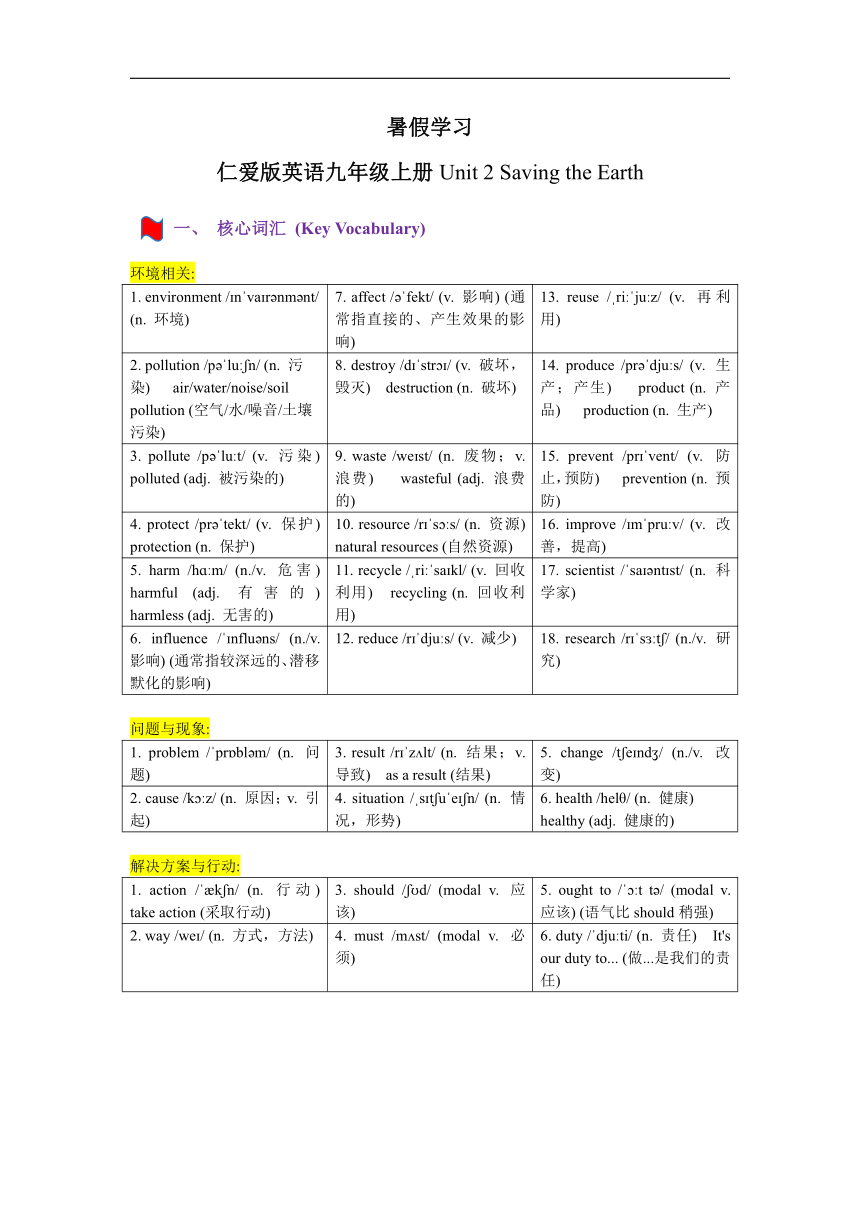
|
|
| 格式 | docx | ||
| 文件大小 | 39.8KB | ||
| 资源类型 | 教案 | ||
| 版本资源 | 仁爱科普版 | ||
| 科目 | 英语 | ||
| 更新时间 | 2025-07-20 08:10:14 | ||
图片预览

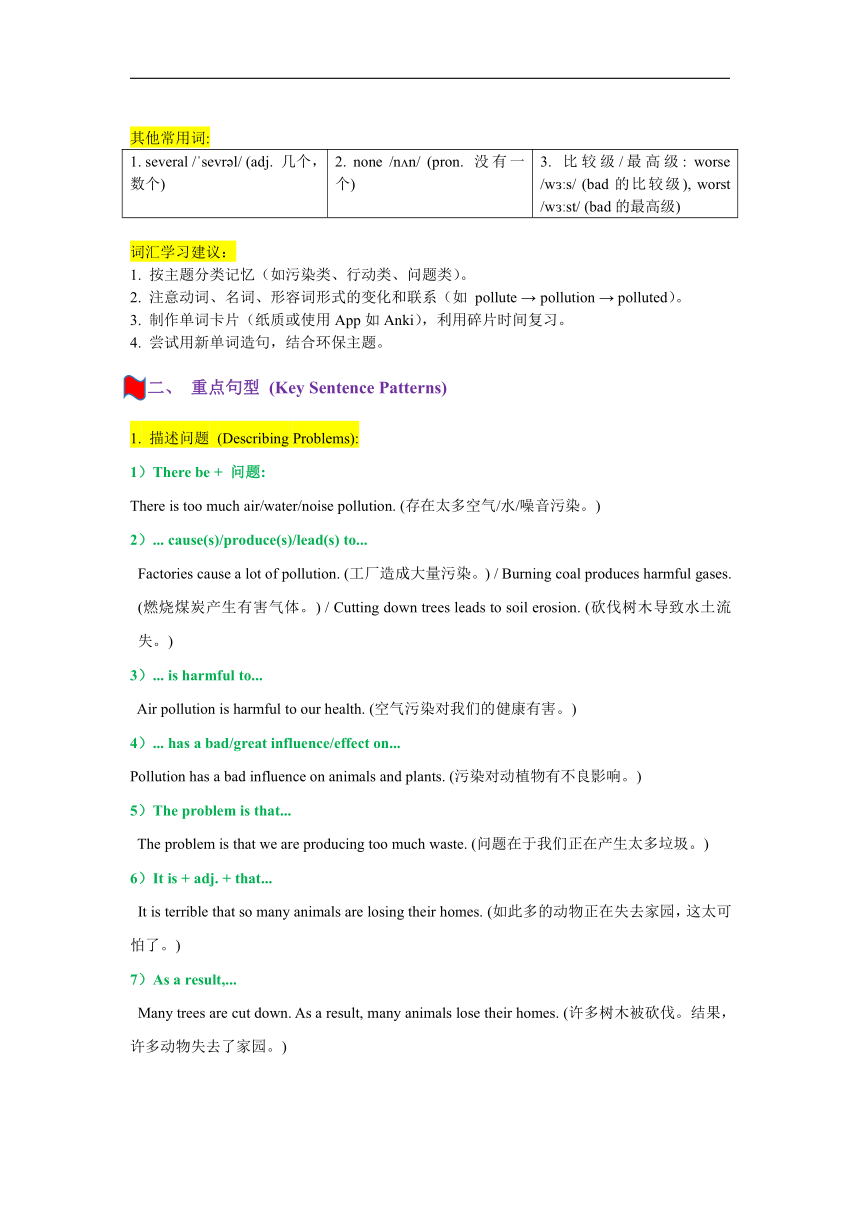
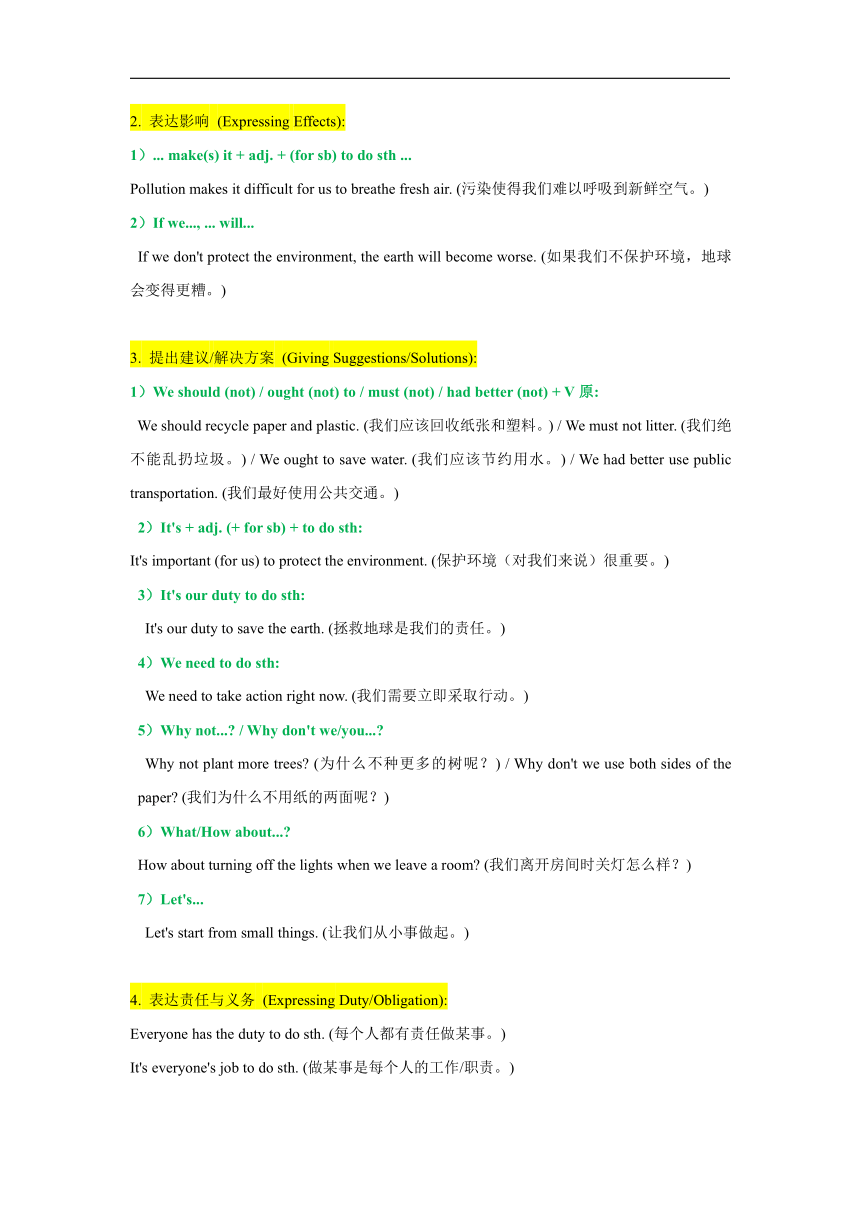
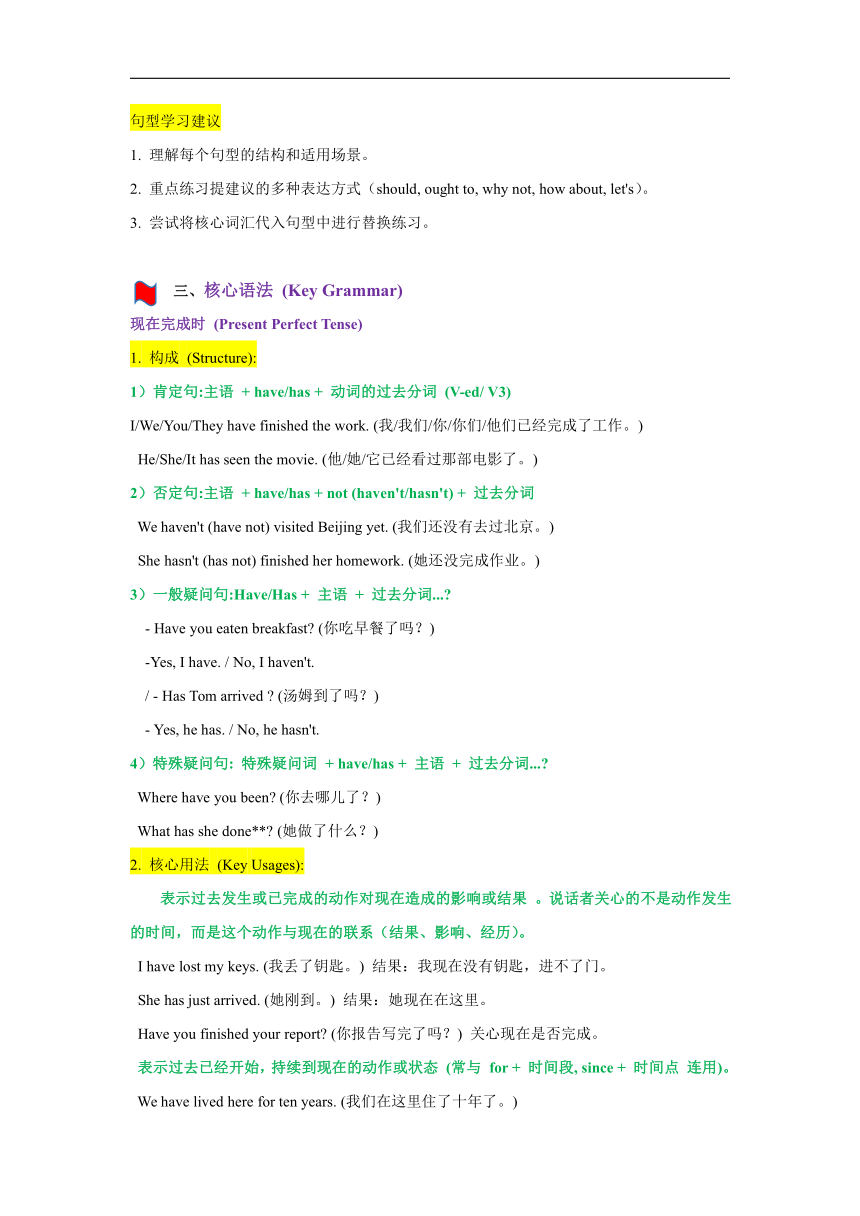
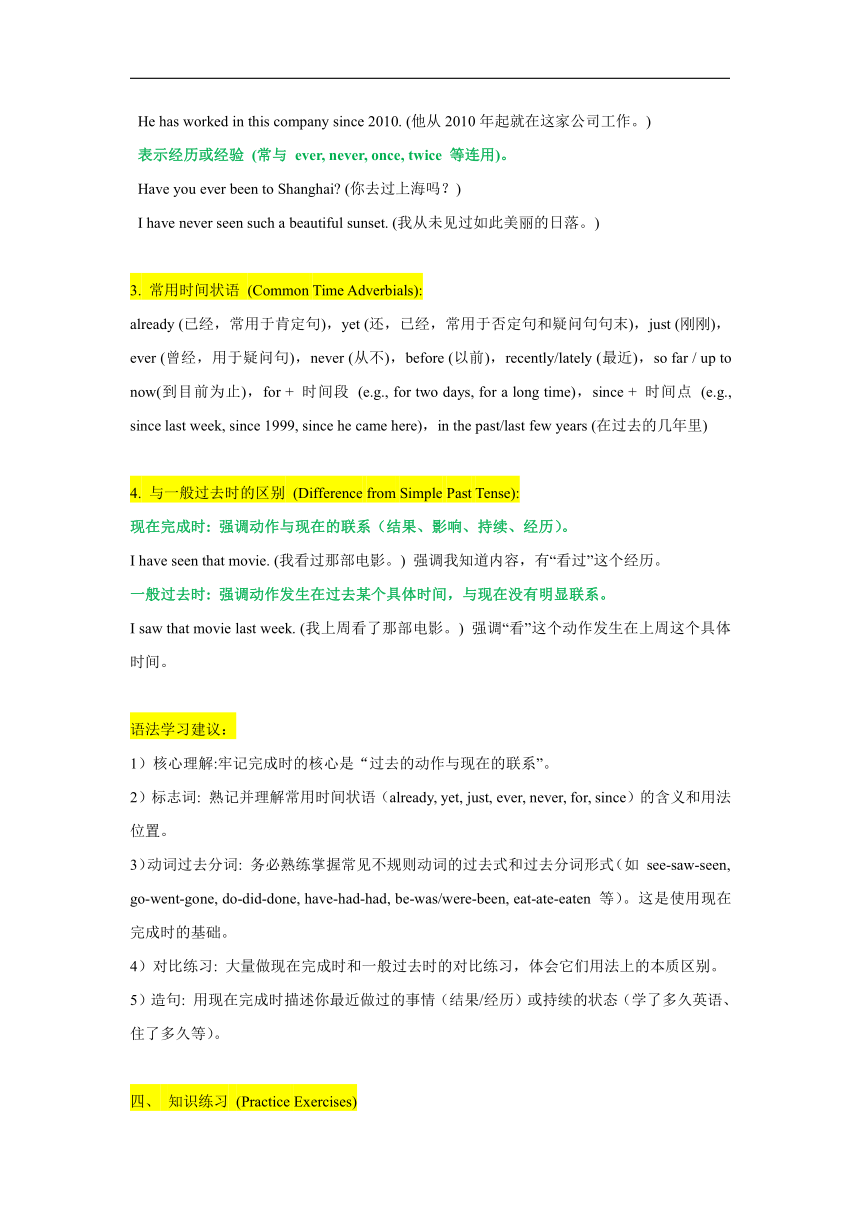
文档简介
暑假学习
仁爱版英语九年级上册Unit 2 Saving the Earth
一、 核心词汇 (Key Vocabulary)
环境相关:
1. environment / n va r nm nt/ (n. 环境) 7. affect / fekt/ (v. 影响) (通常指直接的、产生效果的影响) 13. reuse / ri ju z/ (v. 再利用)
2. pollution /p lu n/ (n. 污染) air/water/noise/soil pollution (空气/水/噪音/土壤污染) 8. destroy /d str / (v. 破坏,毁灭) destruction (n. 破坏) 14. produce /pr dju s/ (v. 生产;产生) product (n. 产品) production (n. 生产)
3. pollute /p lu t/ (v. 污染) polluted (adj. 被污染的) 9. waste /we st/ (n. 废物;v. 浪费) wasteful (adj. 浪费的) 15. prevent /pr vent/ (v. 防止,预防) prevention (n. 预防)
4. protect /pr tekt/ (v. 保护) protection (n. 保护) 10. resource /r s s/ (n. 资源) natural resources (自然资源) 16. improve / m pru v/ (v. 改善,提高)
5. harm /hɑ m/ (n./v. 危害) harmful (adj. 有害的) harmless (adj. 无害的) 11. recycle / ri sa kl/ (v. 回收利用) recycling (n. 回收利用) 17. scientist / sa nt st/ (n. 科学家)
6. influence / nflu ns/ (n./v. 影响) (通常指较深远的、潜移默化的影响) 12. reduce /r dju s/ (v. 减少) 18. research /r s t / (n./v. 研究)
问题与现象:
1. problem / pr bl m/ (n. 问题) 3. result /r z lt/ (n. 结果;v. 导致) as a result (结果) 5. change /t e nd / (n./v. 改变)
2. cause /k z/ (n. 原因;v. 引起) 4. situation / s t u e n/ (n. 情况,形势) 6. health /helθ/ (n. 健康) healthy (adj. 健康的)
解决方案与行动:
1. action / k n/ (n. 行动) take action (采取行动) 3. should / d/ (modal v. 应该) 5. ought to / t t / (modal v. 应该) (语气比should稍强)
2. way /we / (n. 方式,方法) 4. must /m st/ (modal v. 必须) 6. duty / dju ti/ (n. 责任) It's our duty to... (做...是我们的责任)
其他常用词:
1. several / sevr l/ (adj. 几个,数个) 2. none /n n/ (pron. 没有一个) 3. 比较级/最高级: worse /w s/ (bad的比较级), worst /w st/ (bad的最高级)
词汇学习建议:
按主题分类记忆(如污染类、行动类、问题类)。
2. 注意动词、名词、形容词形式的变化和联系(如 pollute → pollution → polluted)。
3. 制作单词卡片(纸质或使用App如Anki),利用碎片时间复习。
4. 尝试用新单词造句,结合环保主题。
二、 重点句型 (Key Sentence Patterns)
1. 描述问题 (Describing Problems):
1)There be + 问题:
There is too much air/water/noise pollution. (存在太多空气/水/噪音污染。)
2)... cause(s)/produce(s)/lead(s) to...
Factories cause a lot of pollution. (工厂造成大量污染。) / Burning coal produces harmful gases. (燃烧煤炭产生有害气体。) / Cutting down trees leads to soil erosion. (砍伐树木导致水土流失。)
... is harmful to...
Air pollution is harmful to our health. (空气污染对我们的健康有害。)
... has a bad/great influence/effect on...
Pollution has a bad influence on animals and plants. (污染对动植物有不良影响。)
The problem is that...
The problem is that we are producing too much waste. (问题在于我们正在产生太多垃圾。)
It is + adj. + that...
It is terrible that so many animals are losing their homes. (如此多的动物正在失去家园,这太可怕了。)
As a result,...
Many trees are cut down. As a result, many animals lose their homes. (许多树木被砍伐。结果,许多动物失去了家园。)
2. 表达影响 (Expressing Effects):
1)... make(s) it + adj. + (for sb) to do sth ...
Pollution makes it difficult for us to breathe fresh air. (污染使得我们难以呼吸到新鲜空气。)
2)If we..., ... will...
If we don't protect the environment, the earth will become worse. (如果我们不保护环境,地球会变得更糟。)
3. 提出建议/解决方案 (Giving Suggestions/Solutions):
1)We should (not) / ought (not) to / must (not) / had better (not) + V原:
We should recycle paper and plastic. (我们应该回收纸张和塑料。) / We must not litter. (我们绝不能乱扔垃圾。) / We ought to save water. (我们应该节约用水。) / We had better use public transportation. (我们最好使用公共交通。)
It's + adj. (+ for sb) + to do sth:
It's important (for us) to protect the environment. (保护环境(对我们来说)很重要。)
It's our duty to do sth:
It's our duty to save the earth. (拯救地球是我们的责任。)
We need to do sth:
We need to take action right now. (我们需要立即采取行动。)
Why not... / Why don't we/you...
Why not plant more trees (为什么不种更多的树呢?) / Why don't we use both sides of the paper (我们为什么不用纸的两面呢?)
What/How about...
How about turning off the lights when we leave a room (我们离开房间时关灯怎么样?)
Let's...
Let's start from small things. (让我们从小事做起。)
4. 表达责任与义务 (Expressing Duty/Obligation):
Everyone has the duty to do sth. (每个人都有责任做某事。)
It's everyone's job to do sth. (做某事是每个人的工作/职责。)
句型学习建议
1. 理解每个句型的结构和适用场景。
2. 重点练习提建议的多种表达方式(should, ought to, why not, how about, let's)。
3. 尝试将核心词汇代入句型中进行替换练习。
三、核心语法 (Key Grammar)
现在完成时 (Present Perfect Tense)
1. 构成 (Structure):
1)肯定句:主语 + have/has + 动词的过去分词 (V-ed/ V3)
I/We/You/They have finished the work. (我/我们/你/你们/他们已经完成了工作。)
He/She/It has seen the movie. (他/她/它已经看过那部电影了。)
2)否定句:主语 + have/has + not (haven't/hasn't) + 过去分词
We haven't (have not) visited Beijing yet. (我们还没有去过北京。)
She hasn't (has not) finished her homework. (她还没完成作业。)
3)一般疑问句:Have/Has + 主语 + 过去分词...
- Have you eaten breakfast (你吃早餐了吗?)
-Yes, I have. / No, I haven't.
/ - Has Tom arrived (汤姆到了吗?)
- Yes, he has. / No, he hasn't.
4)特殊疑问句: 特殊疑问词 + have/has + 主语 + 过去分词...
Where have you been (你去哪儿了?)
What has she done** (她做了什么?)
2. 核心用法 (Key Usages):
表示过去发生或已完成的动作对现在造成的影响或结果 。说话者关心的不是动作发生的时间,而是这个动作与现在的联系(结果、影响、经历)。
I have lost my keys. (我丢了钥匙。) 结果:我现在没有钥匙,进不了门。
She has just arrived. (她刚到。) 结果:她现在在这里。
Have you finished your report (你报告写完了吗?) 关心现在是否完成。
表示过去已经开始,持续到现在的动作或状态 (常与 for + 时间段, since + 时间点 连用)。
We have lived here for ten years. (我们在这里住了十年了。)
He has worked in this company since 2010. (他从2010年起就在这家公司工作。)
表示经历或经验 (常与 ever, never, once, twice 等连用)。
Have you ever been to Shanghai (你去过上海吗?)
I have never seen such a beautiful sunset. (我从未见过如此美丽的日落。)
3. 常用时间状语 (Common Time Adverbials):
already (已经,常用于肯定句),yet (还,已经,常用于否定句和疑问句句末),just (刚刚),ever (曾经,用于疑问句),never (从不),before (以前),recently/lately (最近),so far / up to now(到目前为止),for + 时间段 (e.g., for two days, for a long time),since + 时间点 (e.g., since last week, since 1999, since he came here),in the past/last few years (在过去的几年里)
4. 与一般过去时的区别 (Difference from Simple Past Tense):
现在完成时: 强调动作与现在的联系(结果、影响、持续、经历)。
I have seen that movie. (我看过那部电影。) 强调我知道内容,有“看过”这个经历。
一般过去时: 强调动作发生在过去某个具体时间,与现在没有明显联系。
I saw that movie last week. (我上周看了那部电影。) 强调“看”这个动作发生在上周这个具体时间。
语法学习建议:
1)核心理解:牢记完成时的核心是“过去的动作与现在的联系”。
2)标志词: 熟记并理解常用时间状语(already, yet, just, ever, never, for, since)的含义和用法位置。
3)动词过去分词: 务必熟练掌握常见不规则动词的过去式和过去分词形式(如 see-saw-seen, go-went-gone, do-did-done, have-had-had, be-was/were-been, eat-ate-eaten 等)。这是使用现在完成时的基础。
4)对比练习: 大量做现在完成时和一般过去时的对比练习,体会它们用法上的本质区别。
5)造句: 用现在完成时描述你最近做过的事情(结果/经历)或持续的状态(学了多久英语、住了多久等)。
四、 知识练习 (Practice Exercises)
A. 词汇练习 (Vocabulary Practice)
1. 根据句意及首字母或汉语提示填空:
1)The government is taking actions to p_______ the wild animals.
2)Too much noise p_______ can make people sick.
3)We should r_______ paper, glass and plastic to save resources.
4)It's our d_______ to keep our city clean.
5)Air pollution has a bad i_______ on people's health. (影响)
6)We mustn't _______ (浪费) water.
7)Scientists are doing r________ on how to solve the pollution problem. (研究)
8)Cutting down trees _______ (引起) many problems.
2. 选择正确的单词并用其适当形式填空 (protect, harm, pollute, improve, resource):
1)We need to find ways to ______ our living environment.
2)Oil spills can ______ sea life seriously.
3)Water ______ is a big problem in some areas.
4)Forests are important natural ______.
5)Laws are made to ______ endangered animals.
B. 句型练习 (Sentence Pattern Practice)
1. 将下列句子翻译成英语:
1)乱扔垃圾对环境有害。(harmful)
_______________________________________________________________
我们应该节约用电。(save electricity)
_______________________________________________________________
为什么不乘公共汽车去上学呢?(Why not... )
_______________________________________________________________
保护环境是我们的责任。(It's our duty to...)
_______________________________________________________________
工厂排放的废气导致了严重的空气污染。(cause)
_______________________________________________________________
2. 根据提示完成句子:
1)______________________ (太多的汽车) causes traffic jams and air pollution. (There be)
2)______________________ (如果我们不节约用水), we will face a water shortage in the future. (If we...)
3)It's important ______________________ (循环利用旧书和报纸). (to do sth)
4) ______________________ (你最好关掉) the TV if you're not watching it. (had better)
C. 语法练习 (Grammar Practice) 现在完成时
1. 用所给动词的现在完成时形式填空:
1)I __________ (finish) my homework already.
2)She __________ (not see) that movie yet.
3) __________ you ever __________ (be) to the Great Wall (Have... been)
4)They __________ (live) in this city for five years.
5) My father __________ (work) in that factory since he left school.
6) We __________ (just clean) the classroom.
7) __________ Tom __________ (do) his project - No, not yet.
2. 选择 for 或 since 填空:
1) He has been a teacher ______ 2005.
2) They have known each other ______ ten years.
3) I haven't eaten anything ______ this morning.
4) She has studied English ______ a long time.
5) It hasn't rained ______ last month.
3. 用现在完成时或一般过去时填空:
1) I __________ (buy) a new dictionary last Sunday.
2) __________ you __________ (read) this book before
3) Mr. Smith __________ (come) to China three years ago.
4) We __________ (not hear) from him since he moved to London.
5) -- Where is Tom -- He __________ (go) to the library.
6) He __________ (go) to the library an hour ago.
综合练习 (Integrated Practice)
阅读短文,用括号内单词的正确形式填空。
第一篇:
The Dying Forest
Our forest is in great danger. In the past ten years, people 1 (cut) down thousands of trees. As a result, many animals 2 (lose) their homes. The air quality 3 (become) worse too because trees clean the air.
Last month, scientists 4 (find) that the soil here is now polluted. Chemicals from factories
5 (enter) the groundwater. This is harmful 6 our health. If we drink this water, we may get sick.
But all hope is not lost. Our school 7 (start) a project called "Green Hope" since 2023. We
8 (plant) over 500 trees so far. We also tell farmers 9 (not use) harmful chemicals.
10 is everyone’s duty to protect our forest. Why not join us this weekend
第二篇:
Saving Our Oceans
Plastic pollution 1 (be) a huge problem for oceans. Sea animals often mistake plastic bags for food, which 2 (cause) many deaths. So far, humans 3 (produce) over 8 billion tons of plastic!
We must take action. First, we ought 4 (reduce) plastic use. Why not 5 (carry) reusable bottles Second, recycling 6 (be) everyone’s duty. My family 7 (recycle) all plastic waste for three years. 8 you ever 9 (try) it
Remember: small changes 10 (make) a big difference!
参考答案:
词汇练习
1. 根据句意及首字母或汉语提示填空
1)protect 2) pollution 3)reuse 4) duty 5) influence
6) waste 7) research 8)cause
2. 选择正确的单词并用其适当形式填空
1) improve 2)pollute 3)pollution 4)resources 5)protect
B. 句型练习
1. 将下列句子翻译成英语:
1) Littering is harmful to the environment.
2) We should save electricity.
3) Why not take the bus to school
4) It's our duty to protect the environment.
5) Waste gas from factories causes serious air pollution.
2. 根据提示完成句子:
1)There are too many cars
2)If we don't save water
3)to recycle old books and newspapers
4)You’d better turn off
语法练习 (Grammar Practice) 现在完成时:
1. 用所给动词的现在完成时形式填空:
have finished 2)hasn’t seen 3)Have, been 4)have lived
has worked 6)have just cleaned 7)has done
选择 for 或 since 填空:
since 2) for 3) since 4) for 5) since
用现在完成时或一般过去时填空:
bought 2) Have... read 3) came 4) haven't heard 5) has gone
went
综合练习 (Integrated Practice)
阅读短文,用括号内单词的正确形式填空。
第一篇:1. have cut 2. have lost 3. has become 4. found 5. have entered
to 7. has started 8. have planted 9. not to use 10. It
第二篇:1. is 2. causes 3. have produced 4. to reduce 5. carry
6. is 7. has recycled 8 . Have 9. tried 10. can make
仁爱版英语九年级上册Unit 2 Saving the Earth
一、 核心词汇 (Key Vocabulary)
环境相关:
1. environment / n va r nm nt/ (n. 环境) 7. affect / fekt/ (v. 影响) (通常指直接的、产生效果的影响) 13. reuse / ri ju z/ (v. 再利用)
2. pollution /p lu n/ (n. 污染) air/water/noise/soil pollution (空气/水/噪音/土壤污染) 8. destroy /d str / (v. 破坏,毁灭) destruction (n. 破坏) 14. produce /pr dju s/ (v. 生产;产生) product (n. 产品) production (n. 生产)
3. pollute /p lu t/ (v. 污染) polluted (adj. 被污染的) 9. waste /we st/ (n. 废物;v. 浪费) wasteful (adj. 浪费的) 15. prevent /pr vent/ (v. 防止,预防) prevention (n. 预防)
4. protect /pr tekt/ (v. 保护) protection (n. 保护) 10. resource /r s s/ (n. 资源) natural resources (自然资源) 16. improve / m pru v/ (v. 改善,提高)
5. harm /hɑ m/ (n./v. 危害) harmful (adj. 有害的) harmless (adj. 无害的) 11. recycle / ri sa kl/ (v. 回收利用) recycling (n. 回收利用) 17. scientist / sa nt st/ (n. 科学家)
6. influence / nflu ns/ (n./v. 影响) (通常指较深远的、潜移默化的影响) 12. reduce /r dju s/ (v. 减少) 18. research /r s t / (n./v. 研究)
问题与现象:
1. problem / pr bl m/ (n. 问题) 3. result /r z lt/ (n. 结果;v. 导致) as a result (结果) 5. change /t e nd / (n./v. 改变)
2. cause /k z/ (n. 原因;v. 引起) 4. situation / s t u e n/ (n. 情况,形势) 6. health /helθ/ (n. 健康) healthy (adj. 健康的)
解决方案与行动:
1. action / k n/ (n. 行动) take action (采取行动) 3. should / d/ (modal v. 应该) 5. ought to / t t / (modal v. 应该) (语气比should稍强)
2. way /we / (n. 方式,方法) 4. must /m st/ (modal v. 必须) 6. duty / dju ti/ (n. 责任) It's our duty to... (做...是我们的责任)
其他常用词:
1. several / sevr l/ (adj. 几个,数个) 2. none /n n/ (pron. 没有一个) 3. 比较级/最高级: worse /w s/ (bad的比较级), worst /w st/ (bad的最高级)
词汇学习建议:
按主题分类记忆(如污染类、行动类、问题类)。
2. 注意动词、名词、形容词形式的变化和联系(如 pollute → pollution → polluted)。
3. 制作单词卡片(纸质或使用App如Anki),利用碎片时间复习。
4. 尝试用新单词造句,结合环保主题。
二、 重点句型 (Key Sentence Patterns)
1. 描述问题 (Describing Problems):
1)There be + 问题:
There is too much air/water/noise pollution. (存在太多空气/水/噪音污染。)
2)... cause(s)/produce(s)/lead(s) to...
Factories cause a lot of pollution. (工厂造成大量污染。) / Burning coal produces harmful gases. (燃烧煤炭产生有害气体。) / Cutting down trees leads to soil erosion. (砍伐树木导致水土流失。)
... is harmful to...
Air pollution is harmful to our health. (空气污染对我们的健康有害。)
... has a bad/great influence/effect on...
Pollution has a bad influence on animals and plants. (污染对动植物有不良影响。)
The problem is that...
The problem is that we are producing too much waste. (问题在于我们正在产生太多垃圾。)
It is + adj. + that...
It is terrible that so many animals are losing their homes. (如此多的动物正在失去家园,这太可怕了。)
As a result,...
Many trees are cut down. As a result, many animals lose their homes. (许多树木被砍伐。结果,许多动物失去了家园。)
2. 表达影响 (Expressing Effects):
1)... make(s) it + adj. + (for sb) to do sth ...
Pollution makes it difficult for us to breathe fresh air. (污染使得我们难以呼吸到新鲜空气。)
2)If we..., ... will...
If we don't protect the environment, the earth will become worse. (如果我们不保护环境,地球会变得更糟。)
3. 提出建议/解决方案 (Giving Suggestions/Solutions):
1)We should (not) / ought (not) to / must (not) / had better (not) + V原:
We should recycle paper and plastic. (我们应该回收纸张和塑料。) / We must not litter. (我们绝不能乱扔垃圾。) / We ought to save water. (我们应该节约用水。) / We had better use public transportation. (我们最好使用公共交通。)
It's + adj. (+ for sb) + to do sth:
It's important (for us) to protect the environment. (保护环境(对我们来说)很重要。)
It's our duty to do sth:
It's our duty to save the earth. (拯救地球是我们的责任。)
We need to do sth:
We need to take action right now. (我们需要立即采取行动。)
Why not... / Why don't we/you...
Why not plant more trees (为什么不种更多的树呢?) / Why don't we use both sides of the paper (我们为什么不用纸的两面呢?)
What/How about...
How about turning off the lights when we leave a room (我们离开房间时关灯怎么样?)
Let's...
Let's start from small things. (让我们从小事做起。)
4. 表达责任与义务 (Expressing Duty/Obligation):
Everyone has the duty to do sth. (每个人都有责任做某事。)
It's everyone's job to do sth. (做某事是每个人的工作/职责。)
句型学习建议
1. 理解每个句型的结构和适用场景。
2. 重点练习提建议的多种表达方式(should, ought to, why not, how about, let's)。
3. 尝试将核心词汇代入句型中进行替换练习。
三、核心语法 (Key Grammar)
现在完成时 (Present Perfect Tense)
1. 构成 (Structure):
1)肯定句:主语 + have/has + 动词的过去分词 (V-ed/ V3)
I/We/You/They have finished the work. (我/我们/你/你们/他们已经完成了工作。)
He/She/It has seen the movie. (他/她/它已经看过那部电影了。)
2)否定句:主语 + have/has + not (haven't/hasn't) + 过去分词
We haven't (have not) visited Beijing yet. (我们还没有去过北京。)
She hasn't (has not) finished her homework. (她还没完成作业。)
3)一般疑问句:Have/Has + 主语 + 过去分词...
- Have you eaten breakfast (你吃早餐了吗?)
-Yes, I have. / No, I haven't.
/ - Has Tom arrived (汤姆到了吗?)
- Yes, he has. / No, he hasn't.
4)特殊疑问句: 特殊疑问词 + have/has + 主语 + 过去分词...
Where have you been (你去哪儿了?)
What has she done** (她做了什么?)
2. 核心用法 (Key Usages):
表示过去发生或已完成的动作对现在造成的影响或结果 。说话者关心的不是动作发生的时间,而是这个动作与现在的联系(结果、影响、经历)。
I have lost my keys. (我丢了钥匙。) 结果:我现在没有钥匙,进不了门。
She has just arrived. (她刚到。) 结果:她现在在这里。
Have you finished your report (你报告写完了吗?) 关心现在是否完成。
表示过去已经开始,持续到现在的动作或状态 (常与 for + 时间段, since + 时间点 连用)。
We have lived here for ten years. (我们在这里住了十年了。)
He has worked in this company since 2010. (他从2010年起就在这家公司工作。)
表示经历或经验 (常与 ever, never, once, twice 等连用)。
Have you ever been to Shanghai (你去过上海吗?)
I have never seen such a beautiful sunset. (我从未见过如此美丽的日落。)
3. 常用时间状语 (Common Time Adverbials):
already (已经,常用于肯定句),yet (还,已经,常用于否定句和疑问句句末),just (刚刚),ever (曾经,用于疑问句),never (从不),before (以前),recently/lately (最近),so far / up to now(到目前为止),for + 时间段 (e.g., for two days, for a long time),since + 时间点 (e.g., since last week, since 1999, since he came here),in the past/last few years (在过去的几年里)
4. 与一般过去时的区别 (Difference from Simple Past Tense):
现在完成时: 强调动作与现在的联系(结果、影响、持续、经历)。
I have seen that movie. (我看过那部电影。) 强调我知道内容,有“看过”这个经历。
一般过去时: 强调动作发生在过去某个具体时间,与现在没有明显联系。
I saw that movie last week. (我上周看了那部电影。) 强调“看”这个动作发生在上周这个具体时间。
语法学习建议:
1)核心理解:牢记完成时的核心是“过去的动作与现在的联系”。
2)标志词: 熟记并理解常用时间状语(already, yet, just, ever, never, for, since)的含义和用法位置。
3)动词过去分词: 务必熟练掌握常见不规则动词的过去式和过去分词形式(如 see-saw-seen, go-went-gone, do-did-done, have-had-had, be-was/were-been, eat-ate-eaten 等)。这是使用现在完成时的基础。
4)对比练习: 大量做现在完成时和一般过去时的对比练习,体会它们用法上的本质区别。
5)造句: 用现在完成时描述你最近做过的事情(结果/经历)或持续的状态(学了多久英语、住了多久等)。
四、 知识练习 (Practice Exercises)
A. 词汇练习 (Vocabulary Practice)
1. 根据句意及首字母或汉语提示填空:
1)The government is taking actions to p_______ the wild animals.
2)Too much noise p_______ can make people sick.
3)We should r_______ paper, glass and plastic to save resources.
4)It's our d_______ to keep our city clean.
5)Air pollution has a bad i_______ on people's health. (影响)
6)We mustn't _______ (浪费) water.
7)Scientists are doing r________ on how to solve the pollution problem. (研究)
8)Cutting down trees _______ (引起) many problems.
2. 选择正确的单词并用其适当形式填空 (protect, harm, pollute, improve, resource):
1)We need to find ways to ______ our living environment.
2)Oil spills can ______ sea life seriously.
3)Water ______ is a big problem in some areas.
4)Forests are important natural ______.
5)Laws are made to ______ endangered animals.
B. 句型练习 (Sentence Pattern Practice)
1. 将下列句子翻译成英语:
1)乱扔垃圾对环境有害。(harmful)
_______________________________________________________________
我们应该节约用电。(save electricity)
_______________________________________________________________
为什么不乘公共汽车去上学呢?(Why not... )
_______________________________________________________________
保护环境是我们的责任。(It's our duty to...)
_______________________________________________________________
工厂排放的废气导致了严重的空气污染。(cause)
_______________________________________________________________
2. 根据提示完成句子:
1)______________________ (太多的汽车) causes traffic jams and air pollution. (There be)
2)______________________ (如果我们不节约用水), we will face a water shortage in the future. (If we...)
3)It's important ______________________ (循环利用旧书和报纸). (to do sth)
4) ______________________ (你最好关掉) the TV if you're not watching it. (had better)
C. 语法练习 (Grammar Practice) 现在完成时
1. 用所给动词的现在完成时形式填空:
1)I __________ (finish) my homework already.
2)She __________ (not see) that movie yet.
3) __________ you ever __________ (be) to the Great Wall (Have... been)
4)They __________ (live) in this city for five years.
5) My father __________ (work) in that factory since he left school.
6) We __________ (just clean) the classroom.
7) __________ Tom __________ (do) his project - No, not yet.
2. 选择 for 或 since 填空:
1) He has been a teacher ______ 2005.
2) They have known each other ______ ten years.
3) I haven't eaten anything ______ this morning.
4) She has studied English ______ a long time.
5) It hasn't rained ______ last month.
3. 用现在完成时或一般过去时填空:
1) I __________ (buy) a new dictionary last Sunday.
2) __________ you __________ (read) this book before
3) Mr. Smith __________ (come) to China three years ago.
4) We __________ (not hear) from him since he moved to London.
5) -- Where is Tom -- He __________ (go) to the library.
6) He __________ (go) to the library an hour ago.
综合练习 (Integrated Practice)
阅读短文,用括号内单词的正确形式填空。
第一篇:
The Dying Forest
Our forest is in great danger. In the past ten years, people 1 (cut) down thousands of trees. As a result, many animals 2 (lose) their homes. The air quality 3 (become) worse too because trees clean the air.
Last month, scientists 4 (find) that the soil here is now polluted. Chemicals from factories
5 (enter) the groundwater. This is harmful 6 our health. If we drink this water, we may get sick.
But all hope is not lost. Our school 7 (start) a project called "Green Hope" since 2023. We
8 (plant) over 500 trees so far. We also tell farmers 9 (not use) harmful chemicals.
10 is everyone’s duty to protect our forest. Why not join us this weekend
第二篇:
Saving Our Oceans
Plastic pollution 1 (be) a huge problem for oceans. Sea animals often mistake plastic bags for food, which 2 (cause) many deaths. So far, humans 3 (produce) over 8 billion tons of plastic!
We must take action. First, we ought 4 (reduce) plastic use. Why not 5 (carry) reusable bottles Second, recycling 6 (be) everyone’s duty. My family 7 (recycle) all plastic waste for three years. 8 you ever 9 (try) it
Remember: small changes 10 (make) a big difference!
参考答案:
词汇练习
1. 根据句意及首字母或汉语提示填空
1)protect 2) pollution 3)reuse 4) duty 5) influence
6) waste 7) research 8)cause
2. 选择正确的单词并用其适当形式填空
1) improve 2)pollute 3)pollution 4)resources 5)protect
B. 句型练习
1. 将下列句子翻译成英语:
1) Littering is harmful to the environment.
2) We should save electricity.
3) Why not take the bus to school
4) It's our duty to protect the environment.
5) Waste gas from factories causes serious air pollution.
2. 根据提示完成句子:
1)There are too many cars
2)If we don't save water
3)to recycle old books and newspapers
4)You’d better turn off
语法练习 (Grammar Practice) 现在完成时:
1. 用所给动词的现在完成时形式填空:
have finished 2)hasn’t seen 3)Have, been 4)have lived
has worked 6)have just cleaned 7)has done
选择 for 或 since 填空:
since 2) for 3) since 4) for 5) since
用现在完成时或一般过去时填空:
bought 2) Have... read 3) came 4) haven't heard 5) has gone
went
综合练习 (Integrated Practice)
阅读短文,用括号内单词的正确形式填空。
第一篇:1. have cut 2. have lost 3. has become 4. found 5. have entered
to 7. has started 8. have planted 9. not to use 10. It
第二篇:1. is 2. causes 3. have produced 4. to reduce 5. carry
6. is 7. has recycled 8 . Have 9. tried 10. can make
同课章节目录
- Unit 1 The Changing World
- Topic 1 Our country has developed rapidly.
- Topic 2 The population in developing countries is
- Topic 3 The world has changed for the better.
- Unit 2 Saving the earth.
- Topic 1 Pollution has causes too many problems.
- Topic 2 All these problems are very serious.
- Topic 3 What can we do to protect the environment
- Unit 3 English around the World
- Topic 1 English is widely spoken around the world.
- Topic 2 Some things usually have different meaning
- Topic 3 Could you give us some advice on how to l
- Unit 4 Amazing Science
- Topic 1 When was it invented?
- Topic 2 I'm excited about the things that will be
- Topic 3 China is the third nation that sent a pers
